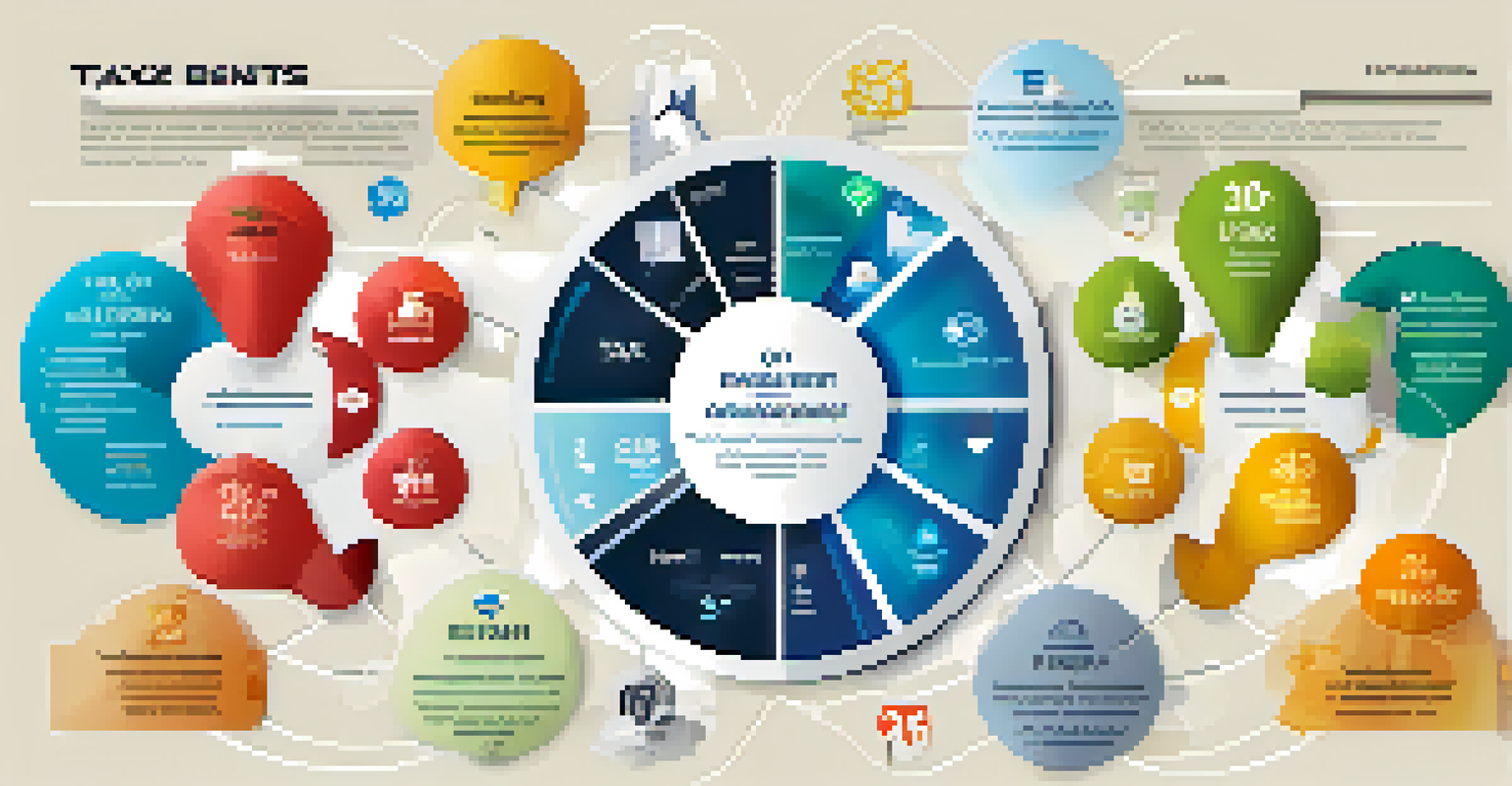Understanding Tax Implications of Employee Benefits Packages

What Are Employee Benefits Packages?
Employee benefits packages are additional perks provided by employers to enhance job satisfaction and attract talent. These packages often include health insurance, retirement plans, and paid time off, among other offerings. Understanding what constitutes a benefits package is essential for both employers and employees, as these benefits can have significant tax implications.
An investment in knowledge pays the best interest.
For businesses, offering a robust benefits package can be a strategic move to improve employee retention and morale. However, it also involves understanding how these benefits are taxed, which can affect the overall cost to the company. On the employee side, knowing how benefits impact personal tax obligations is crucial for financial planning.
In essence, navigating the landscape of employee benefits requires an understanding of both the perks themselves and their tax treatment. This knowledge helps both parties make informed decisions and maximize the value of these packages.
How Benefits Are Taxed for Employees
When it comes to employee benefits, not all perks are created equal regarding taxes. Some benefits, like health insurance premiums paid by employers, are generally not considered taxable income for employees. This means that employees can enjoy these benefits without worrying about their tax bill increasing due to them.

On the other hand, certain benefits, such as bonuses or employer-provided vehicles, can be taxed as income. Employees should be cognizant of which benefits may increase their taxable income, as this can affect their overall tax liability. Understanding these nuances can lead to smarter financial choices throughout the year.
Understanding Employee Benefits Packages
Employee benefits packages enhance job satisfaction and can significantly impact tax obligations for both employees and employers.
In summary, employees need to be aware of how different benefits are taxed to avoid surprises during tax season. Being informed lets them take full advantage of the benefits offered while managing their tax responsibilities effectively.
Employer Tax Deductions for Benefits
Employers can often deduct the costs associated with employee benefits from their taxable income. This means that while they invest in their employees’ well-being, they can also enjoy financial advantages on their tax returns. Common deductions include contributions to retirement plans and premiums for health insurance.
The greatest asset of a company is its people.
Understanding these deductions is vital for businesses looking to optimize their tax strategies. By carefully structuring their benefits packages, employers can reduce their taxable income while providing valuable perks to their staff. This creates a win-win situation, enhancing employee satisfaction while benefiting the company's bottom line.
However, not all benefits are fully deductible, and some may have limitations. Employers must stay informed about the latest tax laws and regulations to ensure they are maximizing their deductions appropriately.
Impact of the Affordable Care Act (ACA)
The Affordable Care Act (ACA) has significantly influenced how employee benefits, especially health insurance, are structured and taxed. Under the ACA, large employers are required to offer affordable health insurance to their full-time employees, which has implications for both tax deductions and employee taxation. This law aims to make healthcare more accessible while also ensuring that employers contribute to their employees’ health coverage.
For businesses, failure to comply with ACA requirements can result in hefty penalties, making it essential to understand the tax implications of providing health insurance. Employers must not only offer coverage but also ensure it meets the ACA's affordability standards to avoid financial repercussions.
Tax Implications of Benefits
Different employee benefits have varying tax treatments, which can affect both employees' taxable income and employers' tax deductions.
Additionally, employees benefit from the protections offered by the ACA, such as guaranteed coverage regardless of pre-existing conditions. This has a direct impact on their taxes, as the premiums paid can often be deducted, further enhancing the overall financial landscape of employee benefits.
Flexible Spending Accounts (FSAs) Explained
Flexible Spending Accounts (FSAs) are tax-advantaged accounts that allow employees to set aside pre-tax dollars for qualified medical expenses. This means that employees can reduce their taxable income while budgeting for healthcare costs. FSAs are an attractive option for many employees, as they provide immediate tax benefits.
Employers can also benefit from offering FSAs, as these accounts can help lower payroll taxes. By allowing employees to contribute to their FSAs, employers can reduce their overall payroll tax liability. This creates an incentive for businesses to include FSAs in their benefits packages, further enhancing their appeal to prospective employees.
However, it’s essential to understand the rules surrounding FSAs, such as the 'use-it-or-lose-it' policy, which can lead to unused funds being forfeited at the end of the year. Navigating these details is crucial for employees to maximize the benefits of their FSAs.
Retirement Benefits and Taxes
Retirement benefits, such as 401(k) plans, play a crucial role in an employee's financial future and come with specific tax implications. Contributions made by employees to these plans are typically made pre-tax, which means they can lower an employee's taxable income for the year. This setup not only aids in retirement savings but also offers immediate tax relief.
Employers also benefit from offering retirement plans, as they can deduct their contributions from their taxable income. Additionally, many employers offer matching contributions, which can further incentivize employees to save for retirement. Understanding the tax benefits associated with these plans can encourage employees to take full advantage of the offerings.
Role of the Affordable Care Act
The Affordable Care Act mandates that large employers provide affordable health insurance, influencing both tax deductions and employee coverage.
However, withdrawals from retirement accounts are generally taxed as income, so employees should plan their withdrawals carefully. This foresight can help them manage their tax liabilities in retirement effectively.
Navigating Tax Reporting for Benefits
When it comes to employee benefits, understanding tax reporting is vital for both employers and employees. Employers must report the value of certain benefits on employees' W-2 forms, making it clear how these perks impact their taxable income. This transparency helps employees understand their financial situation more clearly come tax season.
Employees, in turn, need to be aware of how to report these benefits on their tax returns. Knowledge of which benefits are taxable and how to account for them can streamline the filing process and avoid potential penalties. Staying organized and informed can make tax season much less stressful.

Ultimately, effective communication between employers and employees about tax reporting for benefits can enhance overall satisfaction. Clarity in this area fosters trust and encourages employees to take full advantage of the benefits offered.